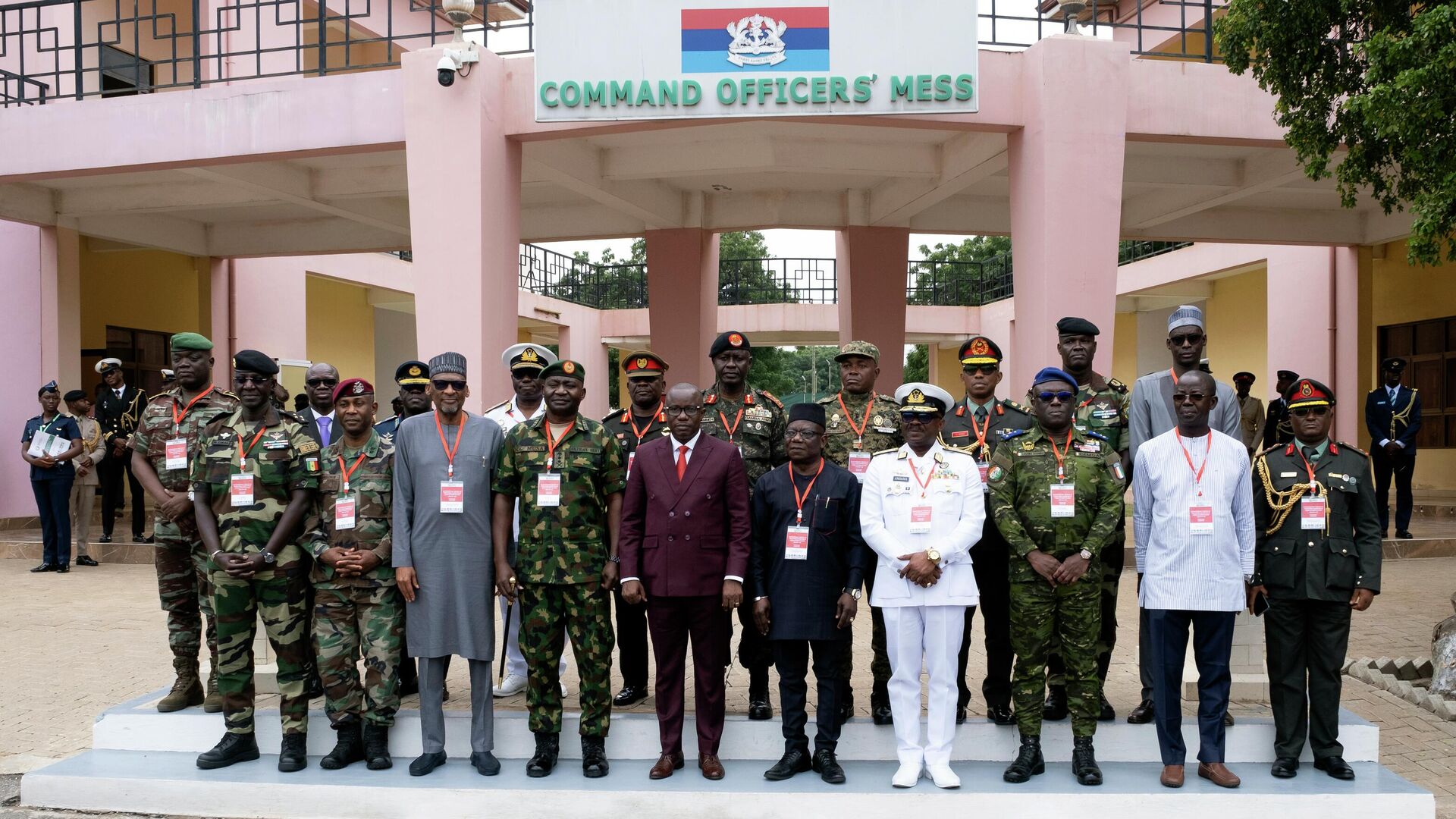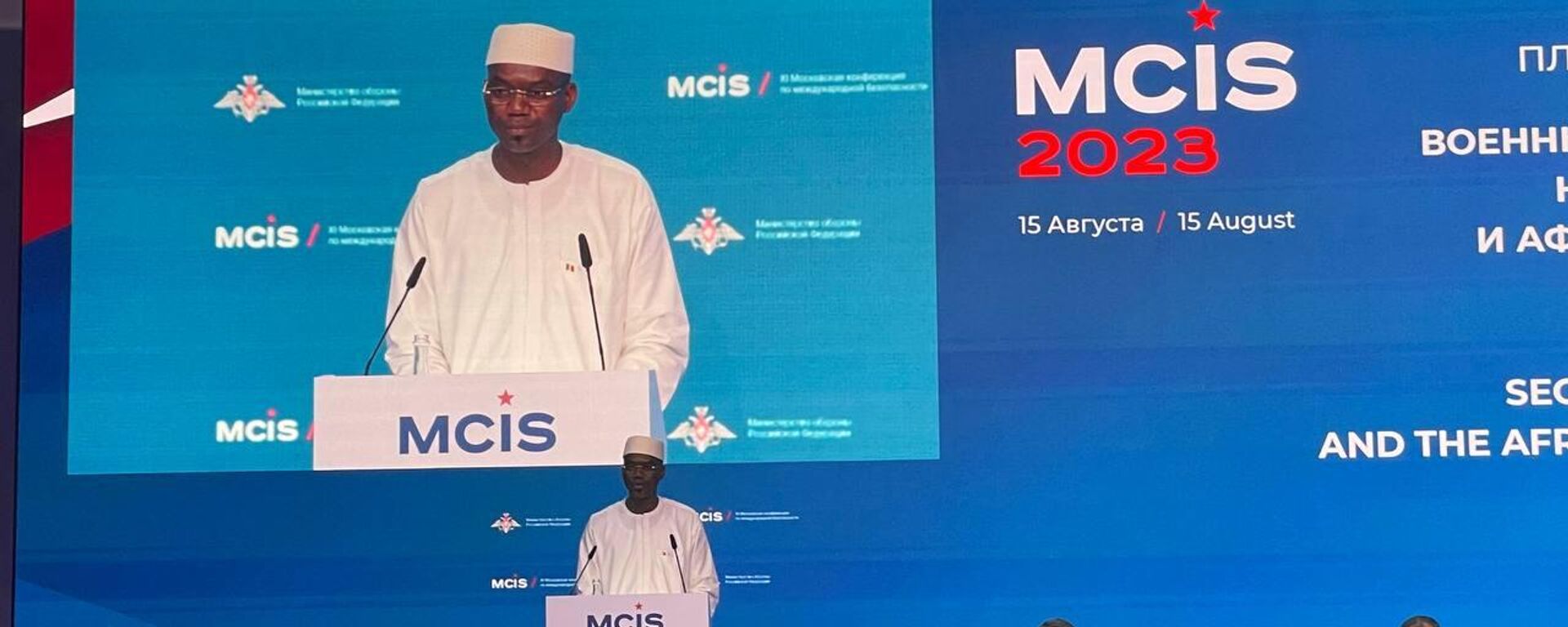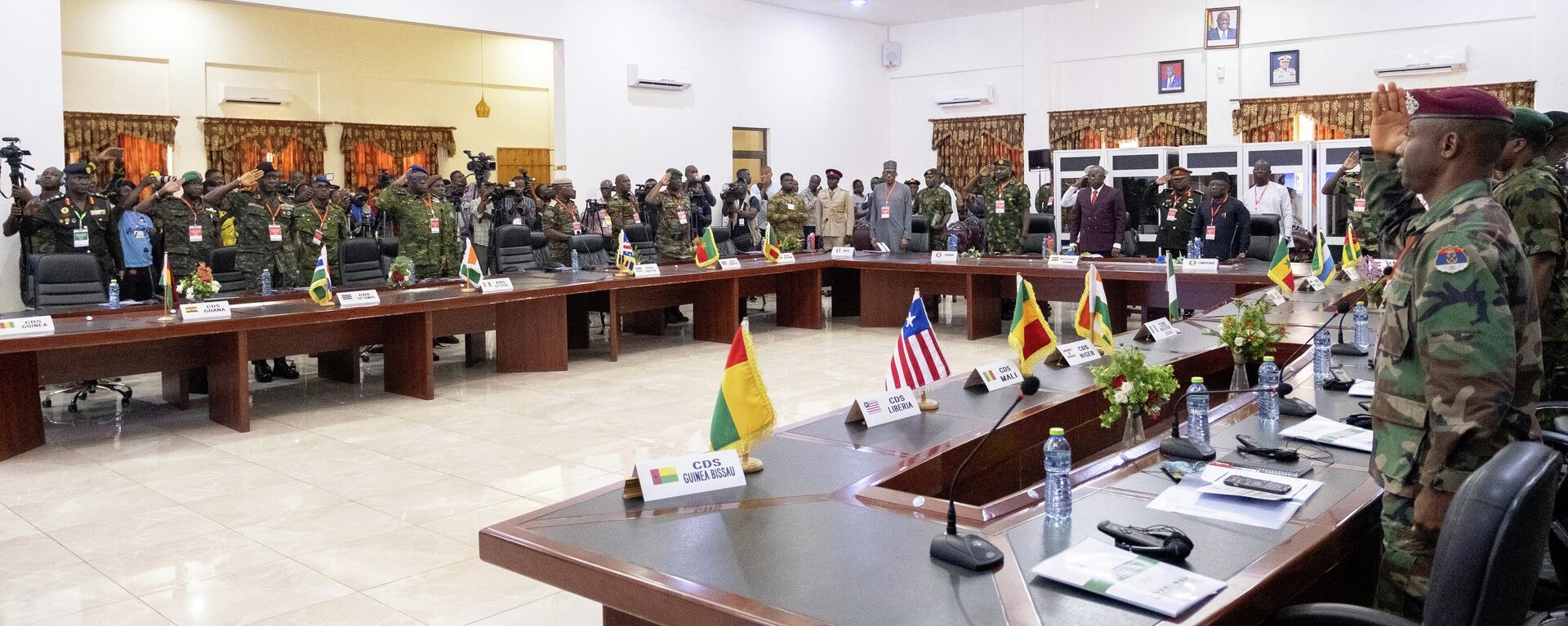https://en.sputniknews.africa/20230818/ecowas-defense-chiefs-dont-rule-out-military-scenario-in-niger-if-diplomacy-fails-1061422965.html
ECOWAS Top Brass Warns Military Scenario Possible in Niger If Diplomacy Fails
ECOWAS Top Brass Warns Military Scenario Possible in Niger If Diplomacy Fails
Sputnik Africa
On August 17-18, the defense chiefs of the Economic Community of West African States (ECOWAS) are convening in Ghana's capital, Accra, to discuss the crisis in... 18.08.2023, Sputnik Africa
2023-08-18T11:59+0200
2023-08-18T11:59+0200
2023-08-18T13:00+0200
situation in niger after military coup
west africa
niger
military coup
military
economic community of west african states (ecowas)
mohamed bazoum
defense
defense minister
intervention
https://cdn1.img.sputniknews.africa/img/07e7/08/12/1061424651_0:144:3127:1903_1920x0_80_0_0_79f610b9f13fbc40a731e64f184ea344.jpg
After several meetings on Niger, the latest of which took place in Accra on Thursday, the West African top military brass reiterated that the scenario of military intervention remains on the table if the country's military leaders refuse to restore order and reinstate President Bazoum. According to ECOWAS Commissioner for Political Affairs, Peace and Security Abdel-Fatau Musah the regional bloc's response to the coup will depend on the future actions of the National Council for the Safeguard of the Homeland (CNSP), which was formed after the military takeover in Niger.Earlier, the commissioner stated that all ECOWAS members, with the exception of those where the military is in power and Cape Verde, are ready to contribute troops for the bloc's standby force.He also confirmed that the regional bloc would use "all available means" to restore security and constitutional order in Niger. In particular, ECOWAS is demanding that Niger's military leadership release President Bazoum, who was ousted and detained by the presidential guard on July 26, warning that it could "use force" as a last resort if negotiations fail. For his part, Nigeria's Chief of Defense Staff, General Christopher Gwabin Musa, emphasized that the purpose of the meeting was "not simply to react to events, but to proactively chart a course" that will enable the member states to maintain peace and stability throughout West Africa.The defense chiefs from the ECOWAS countries, excluding Mali, Burkina Faso, Chad, Guinea and Niger, gathered for their extraordinary meeting in Accra on August 17 to discuss the situation in the West African country.Earlier this week, the regional bloc highlighted the deteriorating security situation in the country, noting that attacks by various armed groups had resulted in the deaths of several Nigerien soldiers. In its press statement, ECOWAS once again urged the military leadership "to restore constitutional order in order to focus on the security of the country that has become increasingly fragile" following the coup.On July 26, President Bazoum of Niger was ousted and detained by his presidential guard. General Abdourahmane Tchiani, commander of the guard, declared himself interim president and formed the CNSP. The latter then appointed Ali Mahaman Lamine Zeine, an economist and finance minister, as interim prime minister.Following the developments, ECOWAS condemned the coup, suspended financial aid to the country, and gave the coup's leaders one week to reinstate the detained president, or the community would use "all measures," including military ones, to restore order. Several European countries also suspended aid to Niger and evacuated their citizens.
https://en.sputniknews.africa/20230815/mali-sees-potential-ecowas-intervention-in-niger-as-cowardly-form-of-neocolonialism-1061353079.html
https://en.sputniknews.africa/20230818/ecowas-chiefs-of-staff-meeting-in-ghana-reportedly-to-agree-date-for-niger-intervention-1061423391.html
west africa
niger
Sputnik Africa
feedback@sputniknews.com
+74956456601
MIA „Rossiya Segodnya“
2023
News
en_EN
Sputnik Africa
feedback@sputniknews.com
+74956456601
MIA „Rossiya Segodnya“
Sputnik Africa
feedback@sputniknews.com
+74956456601
MIA „Rossiya Segodnya“
west africa, niger, military coup, military, economic community of west african states (ecowas), mohamed bazoum, defense, defense minister, intervention, abdourahamane tiani
west africa, niger, military coup, military, economic community of west african states (ecowas), mohamed bazoum, defense, defense minister, intervention, abdourahamane tiani
ECOWAS Top Brass Warns Military Scenario Possible in Niger If Diplomacy Fails
11:59 18.08.2023 (Updated: 13:00 18.08.2023) On August 17-18, the defense chiefs of the Economic Community of West African States (ECOWAS) are convening in Ghana's capital, Accra, to discuss the crisis in Niger, where the military ousted President Mohamed Bazoum and seized power in late July. Deploying an ECOWAS standby force in Niger is one of the meeting's main topics.
After several meetings on Niger, the latest of which took place in Accra on Thursday, the West African top military brass reiterated that the scenario of military intervention remains on the table if the country's military leaders refuse to restore order and reinstate President Bazoum.
According to ECOWAS Commissioner for Political Affairs, Peace and Security Abdel-Fatau Musah the regional bloc's response to the
coup will depend on the future actions of the National Council for the Safeguard of the Homeland (CNSP), which was formed after the military takeover in Niger.
"The ball is in the hand of the junta, the CNSP, in Niger. If they pull back from the brink, the military option will not be necessary. But we want to warn them that all options are on the table, and no options are off the table," Musah said.
Earlier, the commissioner stated that all ECOWAS members, with the exception of those where the military is in power and Cape Verde, are ready to
contribute troops for the bloc's standby force.
He also confirmed that the regional bloc would use "all available means" to restore security and constitutional order in Niger.
In particular, ECOWAS is demanding that Niger's military leadership release President Bazoum, who was ousted and detained by the presidential guard on July 26, warning that it could "use force" as a last resort if negotiations fail.
"If presidential guards in Guinea and Niger, I would use the word 'take hostage' their president, nobody, and let me repeat, nobody in West Africa is safe," Dominic Nitiwul, Ghana's Defence Minister told his counterparts at the meeting in Accra.
For his part, Nigeria's Chief of Defense Staff, General Christopher Gwabin Musa, emphasized that the purpose of the meeting was "not simply
to react to events, but to proactively chart a course" that will enable the member states to maintain peace and stability throughout West Africa.
"Democracy is what we stand for, and it's what we encourage," he said, adding: "We must remember that our collective actions today will shape the legacy we leave for future generations."
The defense chiefs from the ECOWAS countries, excluding Mali, Burkina Faso, Chad, Guinea and Niger,
gathered for their extraordinary meeting in Accra on August 17 to discuss the situation in the West African country.
Earlier this week, the regional bloc highlighted the deteriorating security situation in the country, noting that attacks by various armed groups had resulted in the deaths of several Nigerien soldiers. In its
press statement, ECOWAS once again urged the military leadership "to restore constitutional order in order to focus on the security of the country that has become increasingly fragile" following the coup.
On July 26, President Bazoum of Niger was ousted and detained by his presidential guard. General Abdourahmane Tchiani, commander of the guard, declared himself interim president and formed the CNSP. The latter then appointed Ali Mahaman Lamine Zeine, an economist and finance minister,
as interim prime minister.
Following the developments, ECOWAS condemned the coup, suspended financial aid to the country, and gave the coup's leaders
one week to reinstate the detained president, or the community would use "all measures," including military ones, to restore order. Several European countries also suspended aid to Niger and evacuated their citizens.



